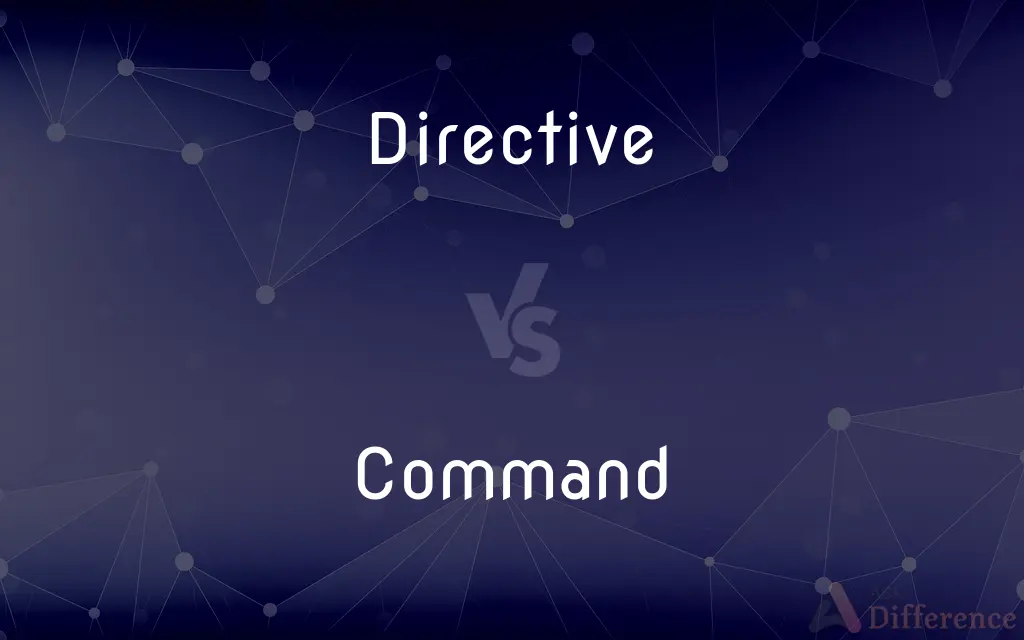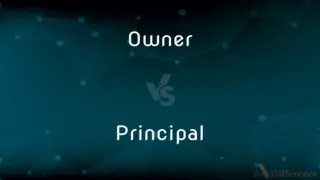Directive vs. Command — What's the Difference?
By Tayyaba Rehman & Maham Liaqat — Updated on April 4, 2024
A directive suggests a course of action, often with room for interpretation, while a command demands a specific action with authority.

Difference Between Directive and Command
Table of Contents
ADVERTISEMENT
Key Differences
Directives and commands are both forms of communication used to elicit a response or action but differ in their approach and the flexibility they allow. A directive is generally broader and can offer guidance or suggest a course of action without specifying exact steps. It often leaves room for interpretation and adaptation based on circumstances. On the other hand, a command is a specific instruction given with authority that requires a direct and often immediate response or action, leaving little to no room for deviation.
In a workplace setting, a manager might issue a directive to improve team efficiency, suggesting general approaches such as optimizing workflows or improving communication. This directive allows team members to interpret and implement solutions as they see fit. Conversely, a command would be more specific, such as instructing an employee to complete a report by the end of the day, which specifies exactly what is expected and when.
Directives are typically used in situations where flexibility and individual judgment are valuable. They are common in strategic contexts where the overall goal is clear, but the means to achieve it may vary depending on changing conditions or new information. Commands, however, are often used in operational contexts where precise actions need to be taken to achieve specific outcomes, and there is little ambiguity about what needs to be done.
The tone and intention behind directives and commands can also differ. Directives often aim to inspire or motivate, encouraging individuals to find the best path forward within a set framework. Commands, by their nature, are authoritative and demand compliance, often used in situations where there is a clear hierarchy or in emergency scenarios where quick action is necessary.
Understanding the difference between a directive and a command is crucial for effective communication, particularly in leadership and management roles. Knowing when to use one over the other can significantly impact how instructions are received and executed, influencing outcomes in business, military, and everyday contexts.
ADVERTISEMENT
Comparison Chart
Definition
A guideline or suggestion for action.
A specific instruction demanding action.
Flexibility
Generally allows for some flexibility.
Usually allows little to no flexibility.
Authority Level
Can be advisory, often without direct authority.
Implies a higher level of authority.
Implementation
Open to interpretation and method.
Requires specific actions to be followed.
Context
Strategic planning, advisory roles.
Operational tasks, emergency situations.
Compare with Definitions
Directive
Broader Objectives.
The environmental directive focused on reducing overall carbon emissions.
Command
Precise Outcome.
The software command executed a specific function within the program.
Directive
Flexibility.
Employees were given a directive to innovate, allowing them to explore various approaches.
Command
Immediate Action.
The commander issued a command to start the operation at dawn.
Directive
Encouragement.
The directive to improve health and safety encouraged staff to propose new ideas.
Command
Specific Task.
The manager’s command was to complete the financial report by Monday.
Directive
Guidance.
The company issued a directive to prioritize customer satisfaction.
Command
Direct Authority.
The teacher’s command silenced the noisy classroom.
Directive
Strategy Implementation.
The CEO’s directive was to enter new markets to increase market share.
Command
No Flexibility.
The emergency services command was to evacuate the building immediately.
Directive
An official or authoritative instruction
A new EC directive
Command
Give an authoritative or peremptory order
‘Stop arguing!’ he commanded
My mother commands my presence
He commanded that work should cease
A gruff voice commanded us to enter
Directive
Involving the management or guidance of operations
The authority is seeking a directive role in energy policy
Command
Dominate (a strategic position) from a superior height
The fortress commands the shortest Channel crossing
Directive
An order or instruction, especially one issued by an authority.
Command
Be in a strong enough position to have or secure
They command a majority in Parliament
He commanded considerable personal loyalty
Directive
Serving to direct, indicate, or guide.
Command
An authoritative order
He obeyed her commands without question
Directive
That which directs; serving to direct, indicate, or guide.
Command
The ability to use or control something
He had a brilliant command of English
Directive
(grammar) Relating to the directive case.
Command
An instruction or signal causing a computer to perform one of its basic functions.
Directive
An instruction or guideline that indicates how to perform an action or reach a goal.
Command
To direct with authority; give orders to.
Directive
(programming) A construct in source code that indicates how it should be processed but is not necessarily part of the program to be run.
Command
To have control or authority over; rule
A general who commands an army.
Directive
An authoritative decision from an official body, which may or may not have binding force.
Command
To have at one's disposal
A person who commands seven languages.
Directive
(European Union law) A form of legislative act addressed to the member states. The directive binds the member state to reach certain objectives in their national legislation.
Command
To deserve and receive as due; exact
The troops' bravery commanded respect.
Directive
(grammar) The directive case.
Command
To exercise dominating, authoritative influence over
"He commands any room he enters" (Stephen Schiff).
Directive
Having power to direct; tending to direct, guide, or govern; showing the way.
The precepts directive of our practice in relation to God.
Command
To dominate by physical position; overlook
A mountain commanding the valley below.
Directive
Able to be directed; manageable.
Swords and bowsDirective by the limbs.
Command
To give orders.
Directive
A pronouncement encouraging or banning some activity;
The boss loves to send us directives
Command
To exercise authority or control as or as if one is a commander.
Directive
Showing the way by conducting or leading; imposing direction on;
Felt his mother's directing arm around him
The directional role of science on industrial progress
Command
The act of commanding.
Command
An order given with authority.
Command
(Computers) A signal that initiates an operation defined by an instruction.
Command
The authority to command
An admiral in command.
Command
Possession and exercise of the authority to command
Command of the seas.
Command
Ability to control or use; mastery
Command of four languages.
Command
Dominance by location; extent of view.
Command
The jurisdiction of a commander.
Command
A military unit, post, district, or region under the control of one officer.
Command
A unit of the US Air Force that is larger than an air force.
Command
Of, relating to, or constituting a command
Command headquarters.
A command decision.
Command
Done or performed in response to a command
A command performance.
Command
An order to do something.
I was given a command to cease shooting.
Command
The right or authority to order, control or dispose of; the right to be obeyed or to compel obedience.
To have command of an army
Command
Power of control, direction or disposal; mastery.
He had command of the situation
England has long held command of the sea
A good command of language
Command
A position of chief authority; a position involving the right or power to order or control.
General Smith was placed in command.
Command
The act of commanding; exercise or authority of influence.
Command
(military) A body or troops, or any naval or military force, under the control of a particular officer; by extension, any object or body in someone's charge.
Command
Dominating situation; range or control or oversight; extent of view or outlook.
Command
(computing) A directive to a computer program acting as an interpreter of some kind, in order to perform a specific task.
Command
(baseball) The degree of control a pitcher has over his pitches.
He's got good command tonight.
Command
A command performance.
Command
(ambitransitive) To order, give orders; to compel or direct with authority.
The soldier was commanded to cease firing.
The king commanded his servant to bring him dinner.
Command
(ambitransitive) To have or exercise supreme power, control or authority over, especially military; to have under direction or control.
To command an army or a ship
Command
(transitive) To require with authority; to demand, order, enjoin.
He commanded silence
Command
(transitive) to dominate through ability, resources, position etc.; to overlook.
Bridges commanded by a fortified house. (Motley.)
Command
(transitive) To exact, compel or secure by influence; to deserve, claim.
A good magistrate commands the respect and affections of the people.
Justice commands the respect and affections of the people.
The best goods command the best price.
This job commands a salary of £30,000.
Command
(transitive) To hold, to control the use of.
The fort commanded the bay.
Command
To have a view, as from a superior position.
Command
(obsolete) To direct to come; to bestow.
Command
To order with authority; to lay injunction upon; to direct; to bid; to charge.
We are commanded to forgive our enemies, but you never read that we are commanded to forgive our friends.
Go to your mistress:Say, I command her come to me.
Command
To exercise direct authority over; to have control of; to have at one's disposal; to lead.
Monmouth commanded the English auxiliaries.
Such aid as I can spare you shall command.
Command
To have within a sphere of control, influence, access, or vision; to dominate by position; to guard; to overlook.
Bridges commanded by a fortified house.
Up to the eastern tower,Whose height commands as subject all the vale.
One side commands a view of the finest garden.
Command
To have power or influence of the nature of authority over; to obtain as if by ordering; to receive as a due; to challenge; to claim; as, justice commands the respect and affections of the people; the best goods command the best price.
'Tis not in mortals to command success.
Command
To direct to come; to bestow.
I will command my blessing upon you.
Command
To have or to exercise direct authority; to govern; to sway; to influence; to give an order or orders.
And reigned, commanding in his monarchy.
For the king had so commanded concerning [Haman].
Command
To have a view, as from a superior position.
Far and wide his eye commands.
Command
An authoritative order requiring obedience; a mandate; an injunction.
Awaiting what command their mighty chiefHad to impose.
Command
The possession or exercise of authority.
Command and force may often create, but can never cure, an aversion.
Command
Authority; power or right of control; leadership; as, the forces under his command.
Command
Power to dominate, command, or overlook by means of position; scope of vision; survey.
The steepy standWhich overlooks the vale with wide command.
Command
Control; power over something; sway; influence; as, to have command over one's temper or voice; the fort has command of the bridge.
He assumed an absolute command over his readers.
Command
A body of troops, or any naval or military force or post, or the whole territory under the authority or control of a particular officer.
Command
An authoritative direction or instruction to do something
Command
A military unit or region under the control of a single officer
Command
The power or authority to command;
An admiral in command
Command
Availability for use;
The materials at the command of the potters grew
Command
A position of highest authority;
The corporation has just undergone a change in command
Command
Great skillfulness and knowledge of some subject or activity;
A good command of French
Command
(computer science) a line of code written as part of a computer program
Command
Be in command of;
The general commanded a huge army
Command
Make someone do something
Command
Demand as one's due;
This speaker commands a high fee
The author commands a fair hearing from his readers
Command
Look down on;
The villa dominates the town
Command
Exercise authoritative control or power over;
Control the budget
Command the military forces
Common Curiosities
Can a directive be considered a form of command?
While both can instruct action, a directive is less authoritative and allows for more flexibility than a command.
Are commands always authoritative?
Yes, commands typically carry an element of authority and require compliance.
What is a directive?
A directive is a form of guidance or instruction that suggests but does not mandate a specific course of action.
In what context might a directive be more effective than a command?
In situations requiring creativity, judgment, or adaptation, directives can be more effective by allowing individuals to apply their understanding and skills.
Is there a place for both directives and commands in management?
Effective management often involves knowing when to use directives to guide and when to use commands to ensure specific outcomes.
Can the misuse of directives and commands lead to issues?
Yes, overuse of commands can demotivate or stifle creativity, while unclear directives can lead to confusion and inefficiency.
How should feedback be incorporated into directives and commands?
Feedback can refine directives and clarify commands, ensuring they are understood and more likely to be followed successfully.
Can a person’s response differ to directives vs. commands?
Yes, individuals may respond more positively to directives if they value autonomy, or to commands if they prefer clear, direct instructions.
How does a command differ from a directive?
A command is a specific instruction that demands a particular action be taken, usually with an implication of authority.
How do directives and commands impact leadership styles?
Leaders who often use directives may foster a more innovative and adaptable environment, while those who frequently use commands may prioritize efficiency and control.
Share Your Discovery

Previous Comparison
Owner vs. Principal
Next Comparison
Surveyor vs. SurveyeeAuthor Spotlight
Written by
Tayyaba RehmanTayyaba Rehman is a distinguished writer, currently serving as a primary contributor to askdifference.com. As a researcher in semantics and etymology, Tayyaba's passion for the complexity of languages and their distinctions has found a perfect home on the platform. Tayyaba delves into the intricacies of language, distinguishing between commonly confused words and phrases, thereby providing clarity for readers worldwide.
Co-written by
Maham Liaqat















































